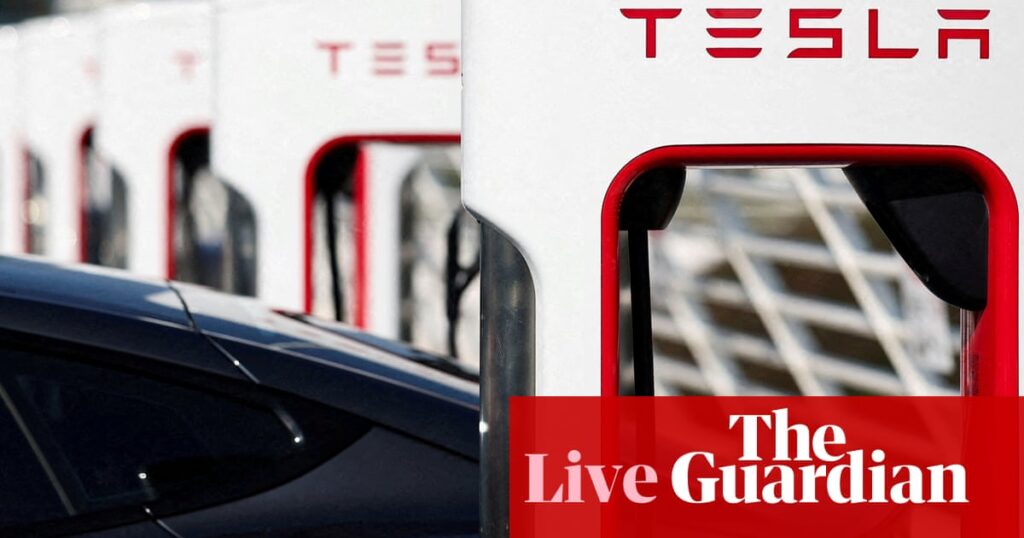Introduction: Tesla’s EU sales slumped in May despite EV market growth
Good morning, and welcome to our rolling coverage of business, the financial markets, and the world economy.
Tesla’s sales across Europe are continuing to slide, even as demand for electric cars rises.
The latest car sales data, just released, shows that Tesla sold 8,729 vehicles across the European Union last month, down from 14,682 in May 2024. That’s a 40.5% drop, which shrinks Tesla’s market share from 1.6% to 0.9%.
Tesla’s shares have been sliding across Europe through 2026, a decline blamed on CEO Elon Musk’s political activities, the company’s outdated model lineup, and competition from rivals such as China’s BYD.
Musk’s high-profile blow-up with president Trump, at the start of June, came too late to affect today’s data. Tesla will be hoping that its updated Model Y model, which was expected to roll out in Europe this month, can reverse the sales slump.
Overall, sales of electric cars rose by 25% last month – with 142,776 battery electric cars sold, up from 114,231 in May 2024.
ACEA, the industry body that collates the data, reports:
-
Up until May 2025, battery-electric cars accounted for 15.4% of the total EU market share, an increase from the low baseline of 12.1% in May 2024 YTD.
-
Hybrid-electric car registrations continue to surge, capturing 35.1% of the market, remaining the preferred choice among EU consumers.
-
Meanwhile, the combined market share of petrol and diesel cars fell to 38.1%, down from 48.5% over the same period in 2024.
The overall European car market grew by 1.6% in May, year on year, but is down 0.6% during 2025.
The agenda
-
10am BST: Treasury committee hearing on the spending review, with Darren Jones MP, Chief Secretary to the Treasury
-
Noon BST: US weekly mortgage approvals data
-
3pm BST: US new home sales data for May
-
3pm BST: Federal Reserve chair Jerome Powell’s second day of testimony to Congress
Key events
TER Hauts-de-France, the regional rail network, has posted that delays and cancellations are expected until early afternoon on the Lille > Douai > Arras route (which runs south from Lille towards Paris).
🟠 7h21
Axe Lille ↔ Douai ↔ ArrasLe trafic est perturbé dans les deux sens sur l’axe après un vol de câbles sur la ligne à grande vitesse. Des retards et suppressions sont à prévoir jusqu’en début d’après-midi. Les applications de mobilité tiennent compte des perturbations. pic.twitter.com/VkjSU2tAf5
— TER Hauts-de-France (@TERHDF) June 25, 2025
Trains between Brussels and London are also being delayed, as are services between St Pancras and Amsterdam.
The Independent reports that there is “huge disruption” on the Eurostar today.
They write:
Passenger Matt Bould told The Independent he had driven all the way from Lyon to Paris to catch a train to England so he can attend Glastonbury Festival.
“My train was cancelled yesterday,” he said, adding he’d rebooked his journey only to have his train cancelled this morning. “There wasn’t a single flight out of Paris until the late evening for £250 and my coach to Glastonbury is leaving at 3pm from London. You can’t go to Glastonbury if you don’t hop on the coach assigned!”
As well as the six trains cancelled (so far) between Paris and London, many more are listed as “delayed”.
The 7.01am BST from St Pancras, for example, is due to arrive an hour late at 11.22am CEST.
There are also delays of roughly an hour the other way – with the 9.12am CEST from Paris now expected at 11.30am BST, not 10.30am BST.
Eurostar service disrupted after cable theft
Passengers on the Eurostar train service are facing delays and cancellations after a cable theft disrupted operations today.
Eurostar has warned that a cable theft near Lille, in France, means its trains are likely to be subject to severe delays and last-minute cancellations.
It has apologised, and advised passngers to cancel or postpone their trip.
Due to a cable theft near Lille Europe, our trains are likely to be subject to severe delays and last-minute cancellations. We advise you to cancel or postpone your trip. We’re very sorry for the impact on your journeys today. https://t.co/uvd7VLRQSd.
— Eurostar (@Eurostar) June 25, 2025
According to Eurostar’s service update page, six trains have been cancelled already today – the ES 9007, ES 9013 and the ES 9023 from Paris Gard du Nord to London St Pancras, and the ES 9008, ES 9018 and ES 9038 from St Pancras to Gard du Nord.
That also follows disruption yesterday, after two people were struck by trains on Tuesday.
Childhood malaria vaccine price to tumble under pharma deal

Julia Kollewe
The price of the world’s first malaria vaccine for children in endemic countries will be reduced by more than half, to less than $5, according to the drugmakers GSK and Bharat Biotech.
The vaccine, called Mosquirix or RTS,S, was developed by GSK and the non-profit health organisation PATH, and was the first malaria vaccine to be recommended by the World Health Organization in October 2021. It is one of two malaria shots recommended by the WHO.
GSK is working on a technology transfer to Bharat, and will continue to supply the adjuvant component of the vaccine to Bharat when the Indian drugmaker fully takes over production of the shot by 2028 (the adjuvant is given to boost the immune response).
The companies said the price reduction is driven by process improvements, expanded production capacity, cost-effective manufacturing, and minimal profit margins.
The vaccine will be rolled out to 12 African countries through routine vaccination programmes by the end of this year, as part of the global Gavi vaccine alliance.
The shot is given to children via four doses, with the first at the age of five months.
Bharat, based in Hyderabad, has invested more than $200m in higher-output manufacturing facilities, product development and technology transfers.
Dr Kwaku Poku Asante, director of the Kintampo health research centre in Ghana, hailed the price reduction as a “pivotal moment” for the malaria community.
He said:
“As an epidemiologist working in malaria vaccine development and delivery, I have seen the impact malaria vaccines are already having on children in high-burden regions of Africa. As a result of the collaboration between the research community in implementing endemic countries, industry, NGOs and multilateral organisations, the world’s first malaria vaccine is helping to reduce all-cause mortality and hospitalisations of severe malaria among children.
“Any lower cost vaccine means children in the most affected communities in endemic countries can be protected. Sustained affordability is essential to ensuring that the progress we’ve made in malaria control is not only maintained, but accelerated.”
In a recent evaluation of the impact by the WHO of an immunisation programme in Ghana, Kenya and Malawi, where over 2 million children received the RTS,S vaccine between 2019 and 2023, the WHO found a 13% reduction in mortality and a 22% reduction in hospitalisations of severe malaria among children age-eligible for vaccination.
UK ‘lines up £500m transport package’ for new Universal theme park at Bedford
Despite the squeeze on the public finances, the UK government has reportedly pledged to spend close to £500m on transport and infrastructure improvements to secure the UK a massive new theme park.
The 476-acre site, south of Bedford, is being planned by US media group Comcast and will be the first Universal-branded theme park and resort in Europe.
According to the Financial Times, the government is planning almost £500m of “infrastructure investment”, including about £270m in rail network upgrades including a new station at Wixams and about £200m for road works. The site is about 35 minutes north of London by train.
Comcast announced in April that it proposed building “a world-class theme park”, which will include “several themed lands”, rides, attractions and other entertainment, alongside a 500-room hotel and a retail, dining and entertainment complex.
Eyebrows may be raised, though, that the UK government can stump up half a billion pounds to improve the transport links, given it is also pressing on with controversial welfare reforms in the face of a growing backlash from its own MPs.
Comcast said in April that the decision to move ahead with the UK project follows a more than year of due diligence and is subject to securing planning approval, with a projected construction start date in 2026.
Goldman Sachs analysts predict the oil price could fall further, if the Israel-Iran ceasefire continues to hold.
They told clients last night:
Our commodities team estimates that Brent would be trading in the mid-60s in the absence of a geopolitical risk premium, suggesting further declines are possible if the ceasefire solidifies. However, the situation remains fluid.
Brent crude is still trading around $68.30 per barrel this morning, down from over $80 at the very start of the week.
Goldman also point out that oil prices are still 11% above their early-June lows, and show how this will push up inflation, and weigh on growth in many emerging market and CEEMEA (Central and Eastern Europe, Middle East, and Africa) countries:
Bloomberg: EU warns a baseline Trump tariff would still spur retaliation
Looking back at trade tensions… the European Union is planning to retaliate if the US imposes its 10% baseline levy on its goods.
“We will need to retaliate and rebalance in some key sectors if the US insists on an asymmetrical deal,” the EU’s industry chief, Stephane Sejourne, told Bloomberg News, including if the “outcome of the negotiations is that a 10% tariff remains.”
The EU and US are trying to reach a trade deal before 9 July, when the 90-day pause on tariffs ends.
Bloomberg report that EU officials expect the US to keep some duties in place, even after trade negotiations are concluded. Until now, the European Commission, which handles trade matters for the EU, hasn’t indicated if that would trigger retaliation from the bloc.
More here: EU Warns a Baseline Trump Tariff Would Still Spur Retaliation
Shares in UK defence Babcock have surged 13% at the start of trading, after it upgraded its medium-term forecasts and hailed a ‘new era’ for defence (see earlier post).
Markets calm as Israel-Iran ceasefire holds
After several turbulent sessions, the financial markets seem calm this morning, as the Israel-Iran ceasefire holds.
London’s FTSE 100 share index has just opened 0.1% higher, up 10 points at 8768, despite reports that the US bombing of Iran’s nuclear facilities may only have set the nuclear program by a few months.
Germany’s DAX has risen 0.3% at the open, with France’s CAC gaining 0.16%.
Oil is slightly higher this morning, with Brent crude up 1.6% at $68.23 per barrel. That follows two days of heavy falls – down 7% on Monday, and 6% yesterday.
Susannah Streeter, head of money and markets at Hargreaves Lansdown, says:
‘’Optimism about the fragile ceasefire holding between Iran and Israel has bubbled through markets, lifting equities, but more doubts are now creeping in about the truce holding.
Wall Street rose in a relief wave, pushing the S&P 500 close to record highs. Sentiment has held up in Asia and European indices largely look set for a positive start to trading. Nevertheless, a little more uncertainty is seeping in. A leaked report from US Intelligence casting doubt on the effectiveness of the US strikes in crippling Tehran’s nuclear capabilities, has led to some worries that military action could resume.
Oil prices remain volatile with Brent Crude heading slightly higher on the speculation about hostilities breaking out again. It’s trading above $68 dollars a barrel, also gaining strength from industry data indicating supplies are tighter in the market.
Babcock profits surge in “new era of defence”

Lauren Almeida
Babcock, one of the biggest suppliers to the Ministry of Defence, has reported a 52% rise in pre-tax profit to £329m for its latest financial year, as its chief executive hails a “new era of defence” this morning.
David Lockwood, the boss of the FTSE 100 company, said:
“There is increasing recognition of the need to invest in defence capability and energy security, both to safeguard populations and to drive economic growth.”
Shares in Babcock have roughly doubled in value in the past year, as various governments have ramped up their commitments to defence spending in the wake of Russia’s invasion of Ukraine and conflict in the Middle East.
Babcock, which employs more than 26,000 people, is perhaps best known for managing Devonport, a naval dockyard in southwest England that is the largest of its kind in western Europe.
Revenue rose by 11% in its latest financial year, driven by strong growth in its nuclear and marine divisions. The nuclear business grew particularly strongly, with revenue up 19%. The company upgraded its guidance over the medium term, with an expected underlying profit margin now at 9%, up from previously forecast 8%. Babcock also announced it would buy back £200m worth of its own shares over the course of its current financial year.
Lockwood, who has led the business since 2020, noted that “a combination of continued global insecurity, rising global threats and rapidly evolving technology” had resulted in a stronger stance on defence and security by governments across its markets.
Babcock told the City:
“Nations are increasingly focused on securing national sovereignty and industrial resilience, prioritising equipment and infrastructure modernisation, evolving technologies and the need to work in partnership with industry.
These trends are likely to drive significant defence spending and increased investment in the civil nuclear sector for the foreseeable future.”
Here’s a chart showing the European car sales market so far this year
China’s premier warns global trade tensions ‘intensifying’
Chinese premier Li Qiang has warned today that global trade tensions are “intensifying”.
Speaking at the opening ceremony of the World Economic Forum’s Annual Meeting of the New Champions 2025 in Tianjin, Li said the global economy was “undergoing profound changes” – a nod to Donald Trump’s trade wars that have shaken the global economy this year.
Li told the event, dubbed the “Summer Davos”:
“Protectionist measures are significantly increasing and global economic and trade frictions are intensifying.
“The global economy is deeply integrated and no country can grow or prosper alone.”
“In times when the global economy faces difficulties, what we need is not the law of the jungle where the weak fall prey to the strong, but cooperation and mutual success for a win-win outcome.”
Speaking a few weeks after the US and China hammered out a new trade ‘framework’, Li also insisted China would “open its doors still wider to the world.
And, in a rebuff to criticism of the world’s current trading systems, Li insisted that economic globalisation will not be reversed, and will “only carve out a new path.”
Introduction: Tesla’s EU sales slumped in May despite EV market growth
Good morning, and welcome to our rolling coverage of business, the financial markets, and the world economy.
Tesla’s sales across Europe are continuing to slide, even as demand for electric cars rises.
The latest car sales data, just released, shows that Tesla sold 8,729 vehicles across the European Union last month, down from 14,682 in May 2024. That’s a 40.5% drop, which shrinks Tesla’s market share from 1.6% to 0.9%.
Tesla’s shares have been sliding across Europe through 2026, a decline blamed on CEO Elon Musk’s political activities, the company’s outdated model lineup, and competition from rivals such as China’s BYD.
Musk’s high-profile blow-up with president Trump, at the start of June, came too late to affect today’s data. Tesla will be hoping that its updated Model Y model, which was expected to roll out in Europe this month, can reverse the sales slump.
Overall, sales of electric cars rose by 25% last month – with 142,776 battery electric cars sold, up from 114,231 in May 2024.
ACEA, the industry body that collates the data, reports:
-
Up until May 2025, battery-electric cars accounted for 15.4% of the total EU market share, an increase from the low baseline of 12.1% in May 2024 YTD.
-
Hybrid-electric car registrations continue to surge, capturing 35.1% of the market, remaining the preferred choice among EU consumers.
-
Meanwhile, the combined market share of petrol and diesel cars fell to 38.1%, down from 48.5% over the same period in 2024.
The overall European car market grew by 1.6% in May, year on year, but is down 0.6% during 2025.
The agenda
-
10am BST: Treasury committee hearing on the spending review, with Darren Jones MP, Chief Secretary to the Treasury
-
Noon BST: US weekly mortgage approvals data
-
3pm BST: US new home sales data for May
-
3pm BST: Federal Reserve chair Jerome Powell’s second day of testimony to Congress


